;
;
;

Attend a local junior hockey game and your attention will be focused on the action out on the ice, naturally. But look around and you’ll see an even larger team that makes the whole thing possible. From the ticket-takers and concession workers to the administrators and player billets, community team
Last updated on May 03, 23
Posted on Jan 19, 18
6 min read
